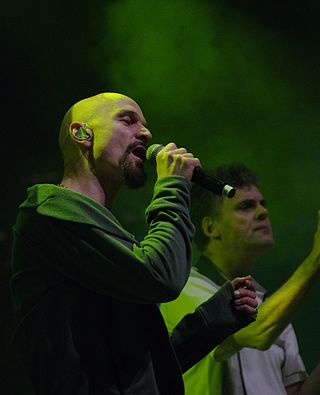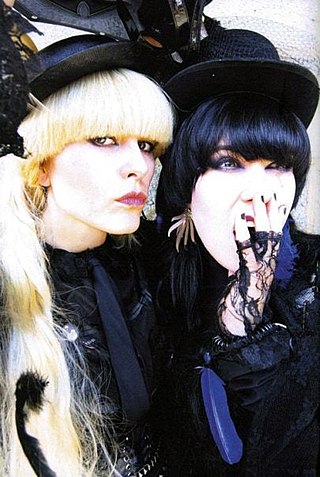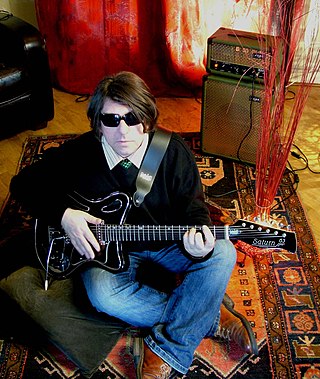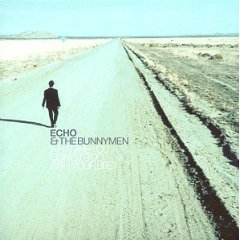Indie rock is a subgenre of rock music that originated in the United States, United Kingdom and New Zealand from the 1970s to the 1980s. Originally used to describe independent record labels, the term became associated with the music they produced and was initially used interchangeably with alternative rock or "guitar pop rock".
Madchester was a musical and cultural scene that developed in the English city of Manchester in the late 1980s, closely associated with the indie dance scene. Indie-dance saw artists merging indie music with elements of acid house, psychedelia and 1960s pop. The term Madchester was coined by Factory Records' Tony Wilson, with the label popularised by the British music press in the early 1990s, and its most famous groups include the Stone Roses, Happy Mondays, Inspiral Carpets, the Charlatans, James and 808 State. It is widely seen as being heavily influenced by drugs, especially MDMA. At that time, the Haçienda nightclub, co-owned by members of New Order, was a major catalyst for the distinctive musical ethos in the city that was called the Second Summer of Love.

James are an English rock band from Manchester, who were formed in 1982. They had popularity throughout the 1990s, with four top 10s on the UK Singles Chart and nine top 10s on the UK Albums Chart. The band's best-known singles include "Come Home", "Sit Down", "She's a Star" and "Laid", which also became a hit on American college radio.
Black Grape are an English rock band, featuring former members of Happy Mondays and Ruthless Rap Assassins. Their musical style fuses funk and electronic rock with electronic programming and samples.
Inspiral Carpets are an English rock band, part of the late-1980s/early-1990s Madchester movement. Formed in Oldham in 1980, the band's most successful lineup featured frontman Tom Hingley, drummer Craig Gill, guitarist Graham Lambert, bassist Martyn Walsh and keyboardist Clint Boon.
The Exies were an American rock band from Los Angeles, California, formed in 1997. Their name, "The Exies", is short for "The Existentialists". Their two Virgin Records releases, Inertia (2003) and Head for the Door (2004), have sold over 400,000 copies combined.
Manchester's music scene produced successful bands in the 1960s including the Hollies, the Bee Gees and Herman's Hermits. After the punk rock era, Manchester produced popular bands including Joy Division, New Order, The Smiths and Simply Red. In the late 1980s, the ecstasy-fuelled dance club scene played a part in the rise of Madchester with bands like the Stone Roses, Inspiral Carpets and Happy Mondays. In the 1990s, Manchester saw the rise of Britpop bands, notably Oasis.

Robots in Disguise are an English electropunk band composed of Dee Plume, Sue Denim and a changing line-up of backing musicians. The group released four studio albums between 2000 and 2011. In 2019, they announced their reunion and an upcoming album.
Baggy was a name given to a British alternative dance genre popular in the late 1980s and early 1990s, with many of the artists referred to as "baggy" being bands from the Madchester scene.
Northside are an English alternative rock band from Blackley and Moston in north Manchester, England. Formed in 1989, they released their only album, Chicken Rhythms, on Factory Records in 1991. The band became part of the 1990s Madchester/baggy/indie-rave scene.

William Alfred Sergeant is an English guitarist, best known for being a member of Echo & the Bunnymen. Born in Walton Hospital, he grew up in the village of Melling and attended nearby Deyes Lane Secondary Modern. He is the group's only constant member.
Candy Flip were a British electronic music duo from Stoke on Trent, who were associated with the indie dance music scene in the early 1990s. They are best remembered for their cover version of the Beatles song "Strawberry Fields Forever", which was a No. 3 hit on the UK Singles Chart in 1990.

Timothy John Booth is an English singer-songwriter, actor and dancer. He is the lead singer and co-founder of the indie rock band James, and co-wrote several of their hit singles including "Sit Down", "Come Home", and "Laid". As an actor, Booth is best known for portraying Victor Zsasz in the 2005 film Batman Begins.
The Mock Turtles are an English indie rock band, formed in Middleton, Greater Manchester, in 1985, who enjoyed some success in the early 1990s. Their most famous song "Can You Dig It?", which was released in the UK in 1991, charted at number 18. When the song was re-released in slightly remixed form in 2003, it again reached the Top 20 of the UK Singles Chart.

What Are You Going to Do with Your Life? is the eighth studio album by the English rock band Echo & the Bunnymen. The album saw the departure of bassist Les Pattinson from the group, partly due to disagreements with vocalist Ian McCulloch; McCulloch and the remaining band member, guitarist Will Sergeant, subsequently recorded the record with session musicians. The London Metropolitan Orchestra provided backing music and the American alternative hip hop band Fun Lovin' Criminals appeared as guest musicians on two tracks. The album was produced by Alan Douglas and Echo & the Bunnymen and it was recorded at various locations throughout England. Feeling sidelined during the recording of the album, Sergeant described it as "probably the worst time in my whole life".
Neo-psychedelia is a diverse genre of psychedelic music that draws inspiration from the sounds of 1960s psychedelia, either updating or copying the approaches from that era. Originating in the 1970s, it has occasionally seen mainstream pop success but is typically explored within alternative rock scenes. It initially developed as an outgrowth of the British post-punk scene, where it was also known as acid punk. After post-punk, neo-psychedelia flourished into a more widespread and international movement of artists who applied the spirit of psychedelic rock to new sounds and techniques.
An independent music scene is a localized independent music-oriented community of bands and their audiences. Local scenes can play a key role in musical history and lead to the development of influential genres; for example, no wave from New York City, Madchester from Manchester, and grunge from Seattle.

John David Robb is an English music journalist and singer.
Paris Angels were an English seven piece band, hailing from Guide Bridge, Ashton-under-Lyne, Greater Manchester, England, associated with the Madchester scene of 1989 -1991. Their music fused indie guitars with electronic dance music. The band comprised Paul 'Wags' Wagstaff, Rikki Turner, Steven Taji, Scott Carey, Mark Adj, Jane Gill and Simon Worrall.
New Fast Automatic Daffodils were an alternative rock group from Manchester, England, active between 1988 and 1995.






